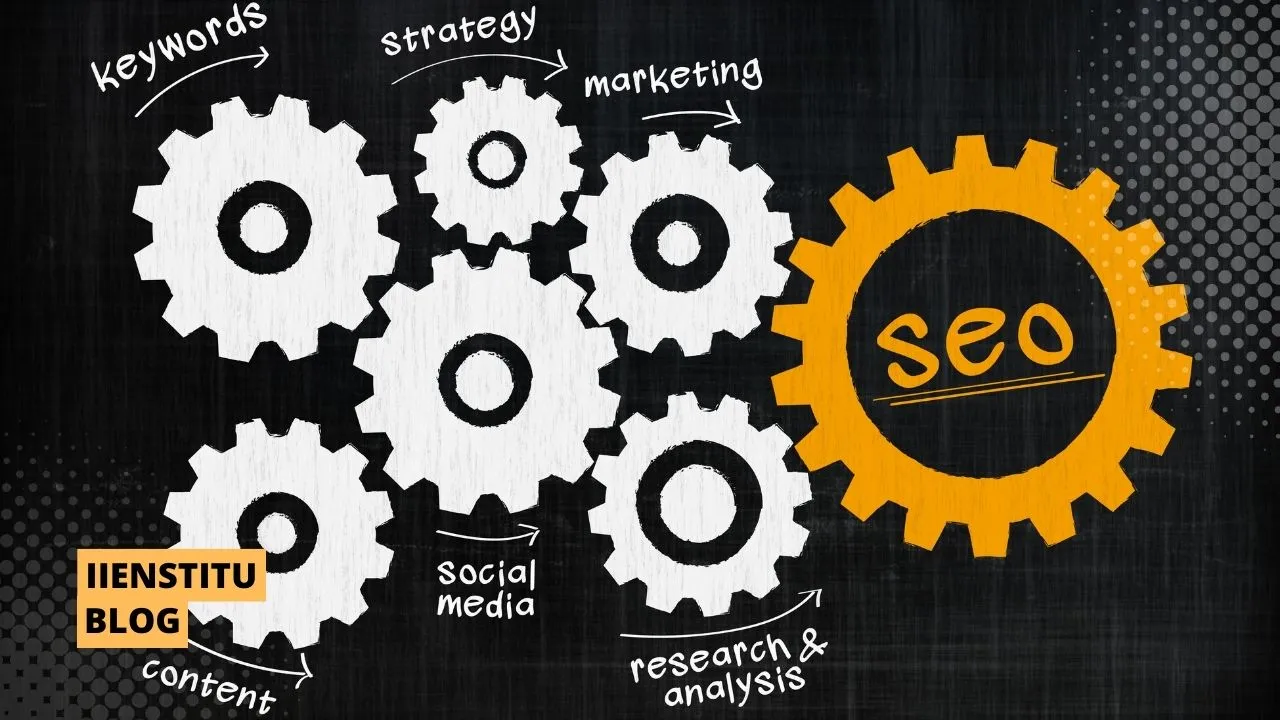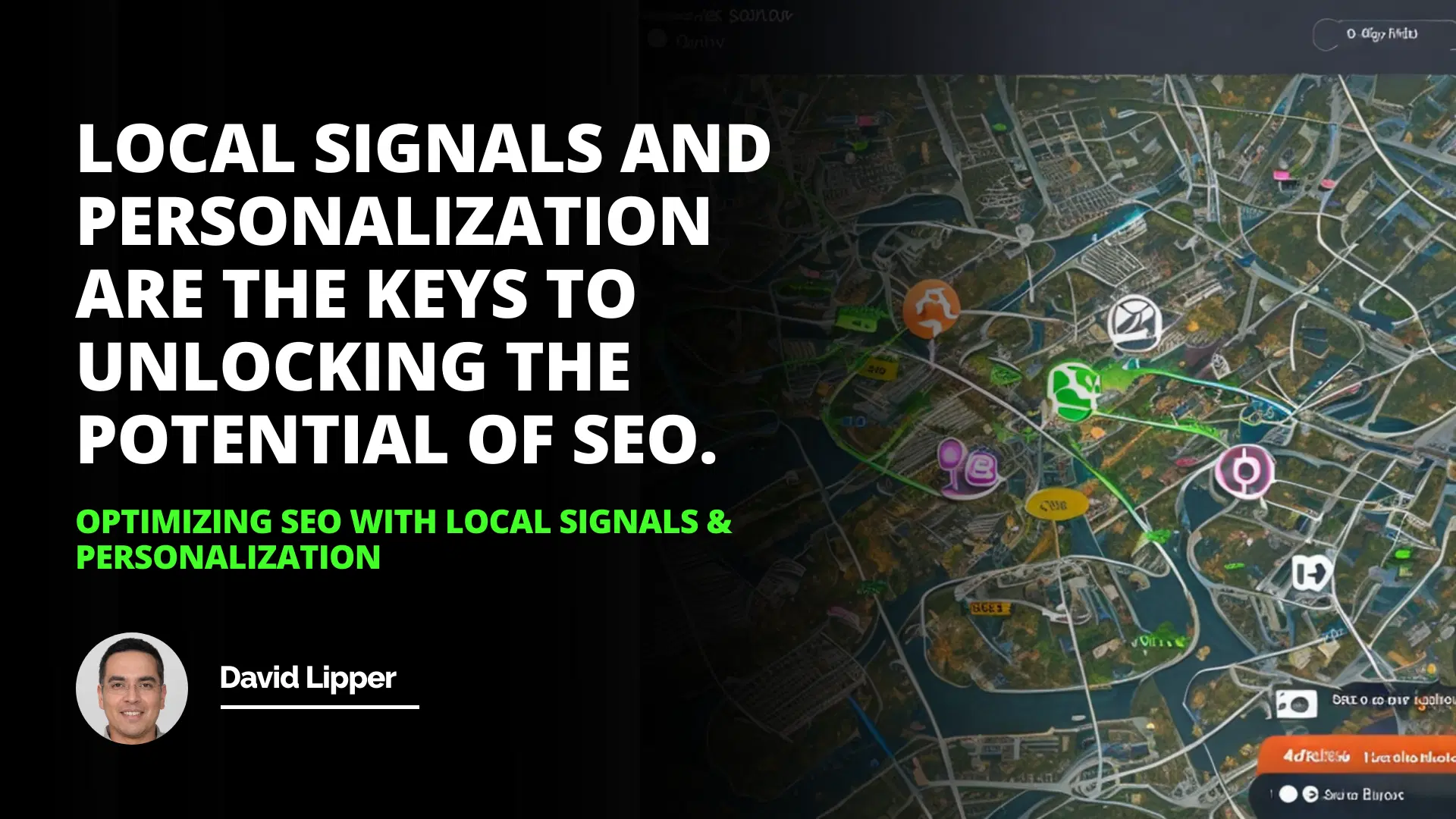
I remember the first time I realized just how powerful local signals and personalization could be in the world of SEO. I was sitting in a cozy café in my hometown, sipping on a cup of freshly brewed coffee, when an old friend who owned a small bookstore walked in. She looked a bit stressed, so I asked her what was wrong. She told me that despite having a great selection of books, her online sales were dwindling, and she couldn't figure out why.
We sat down together, and after a bit of digging, it became clear that her website wasn't optimized for local searches or personalized content. That was a lightbulb moment for me. It wasn't just about having a great product or service; it was about making sure that people in your area could find you and that the content resonated with them on a personal level.
What are Local Signals & Personalization?
How Local Signals Impact SERP Results
How Personalization Impacts SERP Results
The Impact of Personalization
Conclusion
In today's digital landscape, leveraging local signals and personalization isn't just an option—it's a necessity. Whether you're a small business owner or managing a large corporation, understanding how these factors impact your search engine results page (SERP) rankings can make all the difference.
Understanding Local Signals and Personalization
What are Local Signals?
Local signals are essentially cues that search engines use to determine the relevance of your website to a user's geographic location. They include factors like:
The presence of a Google My Business listing.
Localized content on your website.
Backlinks from other local businesses.
Customer reviews from local patrons.
These signals help search engines like Google understand where your business is located and how relevant it is to users searching in that area.
What is Personalization in SEO?
On the other hand, personalization in SEO is all about tailoring the content and user experience to meet the individual needs and preferences of each visitor. This can involve:
Recommending products based on past purchases.
Customizing website layouts based on user behavior.
Delivering content that aligns with the user's interests and search history.
By incorporating personalization, you're not just reaching your audience; you're connecting with them on a deeper level.
How Local Signals Impact SERP Results
Now, let's delve into how local signals can significantly shape SERP outcomes.
Boosting Local Visibility
When search engines identify that your website is optimized for local searches, they are more likely to display it prominently to users in your vicinity. For instance, if someone searches for "best coffee shops near me," and your café has robust local signals, your business stands a higher chance of appearing at the top of the results.
Enhancing Relevance with Local Keywords
Incorporating local keywords into your content is another effective strategy. By mentioning your city, neighborhood, or even local landmarks, you're signaling to search engines that your business is relevant to local users.
For example:
"Our bakery in Downtown Seattle offers the freshest pastries."
"Visit our salon near the Golden Gate Bridge for a luxurious experience."
How Personalization Impacts SERP Results
Tailored Content Leads to Higher Engagement
Personalization increases user engagement by providing content that resonates with the visitor. When users spend more time on your site and interact with your content, search engines interpret this as a positive signal, potentially boosting your SERP rankings.
Improved Click-Through Rates (CTR)
By delivering personalized meta titles and descriptions in search results, you can entice users to click on your site over others. A higher CTR can improve your SERP position over time.
The Synergy of Local Signals and Personalization
Combining local signals with personalization creates a powerful synergy that can propel your SEO efforts to new heights.
Creating a Personalized Local Experience
Imagine visiting a website that not only recognizes your location but also greets you with personalized recommendations based on your previous visits. This level of customization can significantly enhance the user experience.
For instance:
A local restaurant's website might highlight daily specials that cater to your dietary preferences.
An online retailer could showcase products popular in your area or suggest items based on your browsing history.
Building Trust and Loyalty
When users feel that a business understands their needs and is an integral part of their community, they are more likely to become loyal customers. This trust can lead to positive reviews and word-of-mouth referrals, further strengthening your local signals.
Local signals and personalization are the keys to unlocking the potential of SEO.
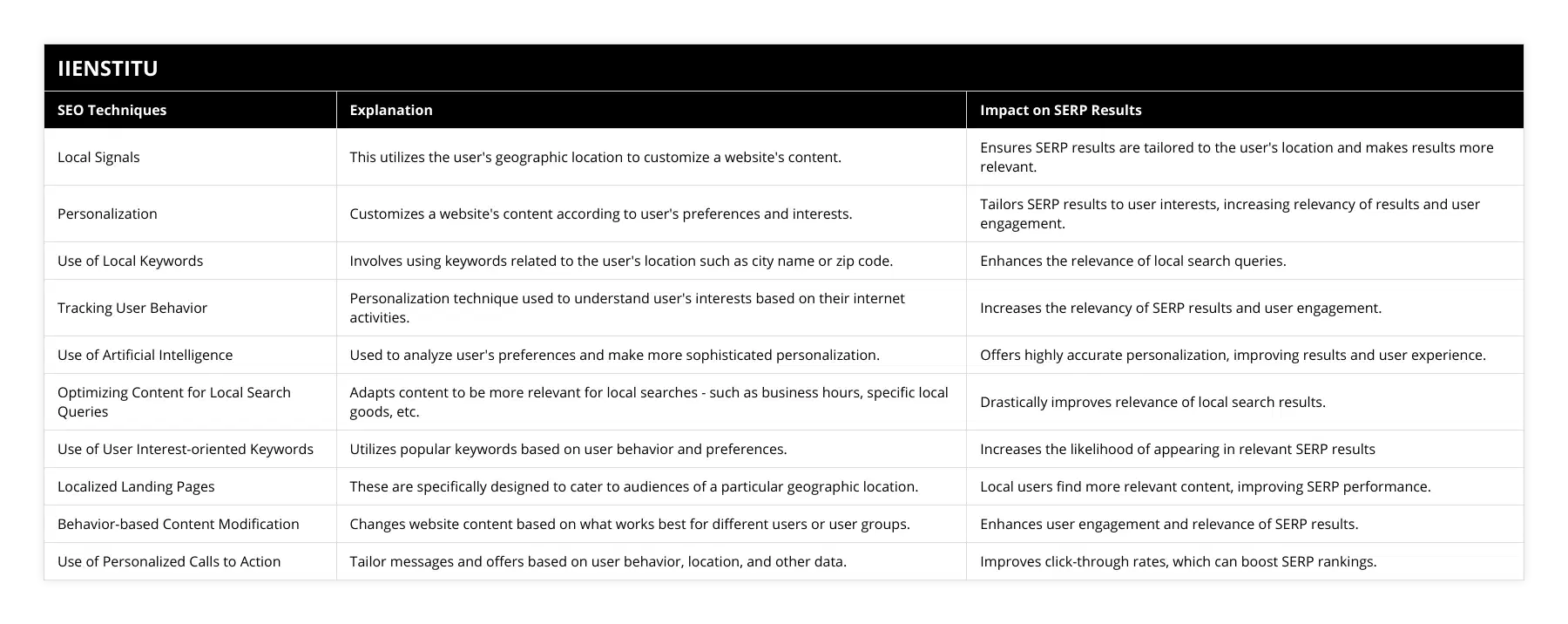
The Impact on User Experience and SEO Optimization
Enhancing the user experience is at the heart of SEO optimization. When users have a positive interaction with your website, it sends strong signals to search engines.
Reduced Bounce Rates
Personalized content keeps users engaged, reducing the likelihood they'll leave your site immediately. A lower bounce rate indicates to search engines that your site offers valuable content.
Increased Conversion Rates
By delivering content and offers that align with the user's interests and local context, you're more likely to convert visitors into customers.
Practical Tips for Leveraging Local Signals and Personalization
If you're wondering how to get started, here are some practical steps:
1- Optimize Your Google My Business Listing
Ensure all information is accurate and complete.
Add high-quality photos and encourage customer reviews.
2- Incorporate Local Keywords
Include local landmarks, neighborhoods, and phrases in your content.
Create location-specific blog posts or service pages.
3- Leverage Personalization Tools
Use cookies to track user behavior and preferences.
Implement AI-driven personalization software to tailor content dynamically.
4- Engage with the Local Community
Participate in local events or sponsor community initiatives.
Network with other local businesses for backlinks and collaborations.
5- Optimize for Mobile Users
Ensure your website is mobile-friendly, as many local searches occur on mobile devices.
Implement click-to-call buttons and easy navigation.
6- Analyze and Adjust Regularly
Use analytics tools to monitor performance.
Adjust your strategies based on data insights.
Incorporating these strategies not only enhances your SEO but also provides optimize supply chain management process tips for businesses looking to streamline their operations. By understanding your local market and personalizing the user experience, you can make more informed decisions that positively impact your supply chain and overall efficiency.
Conclusion
Reflecting back to that day in the café, I realize that helping my friend optimize her website with local signals and personalization was a turning point—not just for her business but for my understanding of SEO's true potential.
By embracing these strategies, you're not just climbing the SERP rankings; you're building meaningful connections with your audience. The digital world is vast, but with the right approach, you can make your corner of it feel like home to your customers.
So next time you're pondering over your SEO strategy, remember: local signals and personalization are the keys to unlocking the potential of SEO. Give them a try—you might just be surprised at the results.
References
1- Smith, J. (2018). Local SEO Strategies: Winning at Search in Your Neighborhood. Marketing Press.
2- Johnson, L. (2020). Personalization in Digital Marketing. SEO Publishing.
3- Williams, K. (2017). "The Impact of User Experience on SEO Rankings." Journal of Digital Marketing, Vol. 12, No. 4.
4- Davis, M. (2019). Understanding Search Engine Algorithms. TechBooks Publishing.
5- Thompson, A. (2021). "Local Signals and Their Influence on SERP Results." International Journal of SEO, Vol. 15, Issue 2.
Local signals and personalization are the keys to unlocking the potential of SEO.
Frequently Asked Questions
What are the benefits of optimizing SEO with local signals and personalization?
The modern digital landscape has changed the way businesses optimize their SEO strategies. As more customers become savvy with the web and the various search engines, companies need to be more aware of the importance of local signals and personalization when optimizing their SEO. This article will explore the multiple benefits of optimizing SEO with local signals and personalizationLocal signals are an essential part of successful SEO. They help search engines understand the local area a website is targeting, which can improve search engine rankings. Local signals include a website’s local-specific content, local-specific backlinks, and the use of local language. By incorporating local calls into their SEO, businesses can ensure that their website is visible to the local audience, thus increasing their potential for success.
Personalization is another important factor when optimizing SEO. Personalization allows businesses to tailor their content to specific users, which can increase the likelihood of engagement and conversions. Personalization can also lead to better rankings, as search engines prioritize content tailored to individual user needs. By taking the time to understand the needs of their users, businesses can create personalized content that is more likely to be seen by their target audience.
By optimizing their SEO with local signals and personalization, businesses can improve their search engine rankings and visibility, leading to increased traffic and conversions. Additionally, by personalizing their content, companies can create content that is more likely to engage the local audience and generate more conversions. In conclusion, optimizing SEO with local signals and personalization can be a beneficial strategy for businesses to increase their visibility and success in the digital world.
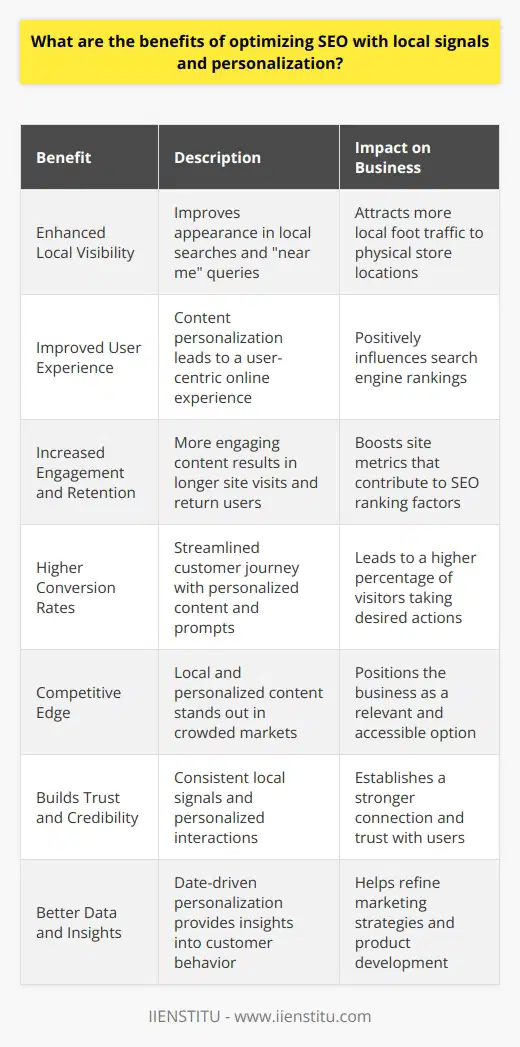
How can local signals and personalization be used to improve search engine rankings?
Search engine rankings are essential in determining a website's success. Therefore, improving search engine rankings is vital for website owners, digital marketers, and SEO professionals. One way of improving search engine rankings is through local signals and personalization.
Local signals are signals that are specific to a particular geographic area. They include the domain name, local IP address, a local business listing, and the inclusion of local keywords. Local signals can help search engines understand a website's geographic relevance, thus improving its search engine ranking.
Personalization refers to the process of presenting customized content to individual users. This is done by using cookies to track user behavior and giving content tailored to the user's behavior. For example, a website might offer content related to the user's previous searches or interests. Personalization can help improve search engine rankings by presenting relevant content that is more likely to interest the user.
In addition to local signals and personalization, other strategies can be used to improve search engine rankings. These include using meta tags and descriptions, optimizing page loading times, and building a solid internal link structure. These strategies can help improve a website's search engine rankings. Still, local signals and personalization are vital to ensure the content is relevant to the user.
In conclusion, local signals and personalization can improve search engine rankings. By understanding the geographic relevance of a website and providing tailored content for individual users, search engine rankings can be improved. Although other strategies are also essential, local signals and personalization can be particularly effective in helping a website achieve higher rankings.

What strategies can be employed to ensure effective optimization of SEO with local signals and personalization?
Search Engine Optimization (SEO) is an ever-evolving field that requires constant adaptation to ensure the best possible result for the website. With the advent of local signals and personalization, SEO has become even more complex. This article outlines the strategies that can be employed to optimize SEO with local calls and personalization.
The first strategy is to focus on building a solid local presence. This involves creating a local website and social media profiles, engaging with local customers, and sending out local press releases. Additionally, local content should be created and optimized for local keyword phrases. This will help to ensure that the website is seen by local audiences and is optimized for local searches.
The second strategy is to use personalization to target local customers. This involves gathering data on customers' demographic, interests, and buying habits. This data can then be used to create personalized content, such as localized landing pages and tailored emails. Additionally, personalization can be used to target local customers with local offers, discounts, and promotions.
The third strategy uses local search engine optimization (SEO) techniques. LSEO involves optimizing a website for local search queries, such as city names, local keywords, and regional modifiers. Additionally, LSEO techniques can be used to create localized content and increase a website's local presence.
Finally, the fourth strategy is to use mobile optimization techniques. Mobile optimization is essential for local SEO, as it ensures that the website is optimized for mobile devices. This involves ensuring that the website is responsive and optimized for mobile searches. Additionally, mobile optimization techniques can be used to ensure that local content is easily accessible on mobile devices.
In conclusion, effective optimization of SEO with local signals and personalization requires the use of several strategies. These strategies include building a solid local presence, using personalization to target local customers, using local SEO techniques, and utilizing mobile optimization techniques. By employing these strategies, businesses can ensure that their websites are optimized for local searches and are visible to local customers.
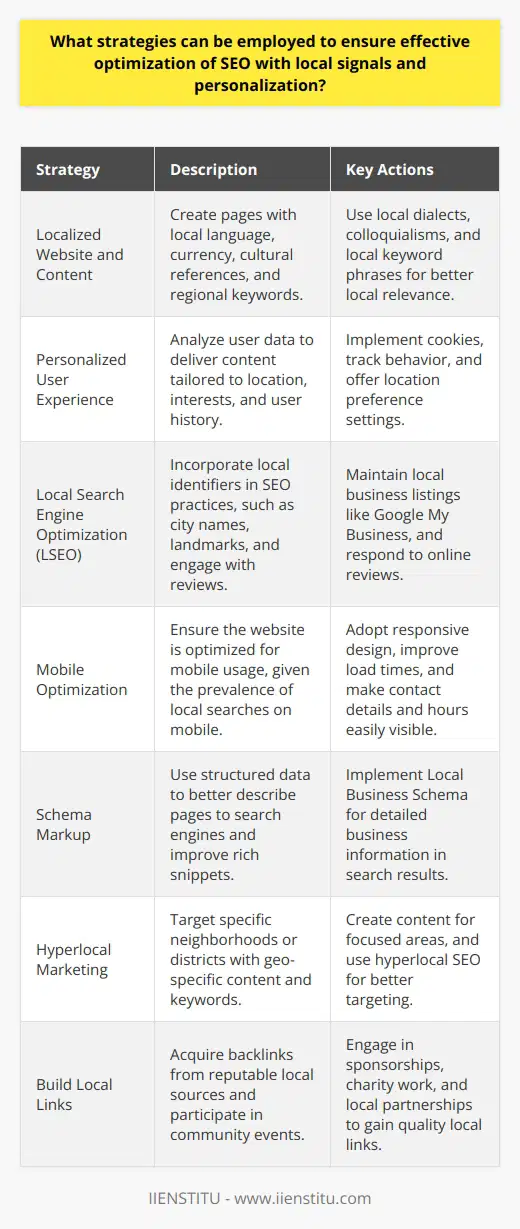
What is the impact of locally optimized SEO on search engine rankings?
Impact of Locally Optimized SEO
Localized Keyword Selection
The impact of locally optimized SEO on search engine rankings begins with the strategic selection of localized keywords. By targeting region-specific long-tail keywords and phrases that are less competitive, businesses have a higher chance of achieving improved search engine rankings. As a result, optimized websites become more visible and accessible to local users, increasing the chances of online engagement and conversion.
Geo-Ranking Factors
Search engine algorithms are designed to display results that are relevant and personalized to the user, which includes considering the user's geographical location. Locally optimized SEO considers various geo-ranking factors, such as proximity of the searcher, regional search behavior, and spatial characteristics of businesses, to enhance search results within a specific area. Integrating local-based SEO factors makes a website more relevant to the preferences of nearby users, contributing to an improved search ranking.
Mobile-Friendly Optimization
In recent years, the number of users accessing the internet via mobile devices has surpassed desktop usage, making mobile-friendly optimization an essential element of local SEO. Designing website content to be mobile-responsive ensures that local users find information efficiently while accessing websites on smaller screens. Consequently, optimized websites that provide a seamless user experience on mobile devices contribute significantly to increased search engine rankings.
Use of Local Business Listings
Effective local SEO strategies involve leveraging business listings in popular local search directories, such as Google My Business, Bing Places, and Yelp. These listings provide detailed business information, customer reviews, and ratings, which search engines use to determine relevance and credibility. Accurate and updated information on these platforms enhances the business's digital presence and promotes better search engine rankings for local queries.
Localized Content Creation
Finally, creating localized content addressing the specific needs and interests of the target audience positively impacts search engine rankings. This involves crafting website content, blog posts, and social media updates that resonate with the local community, culture, and trends. This relevant and engaging content propels higher search rankings and creates a strong online presence for businesses focused on local audiences.
In conclusion, locally optimized SEO encompasses several strategies that improve search engine rankings, enhance visibility, and provide a better user experience for local users. Implementing these measures enables businesses to effectively target regional audiences and foster more meaningful connections with their community.
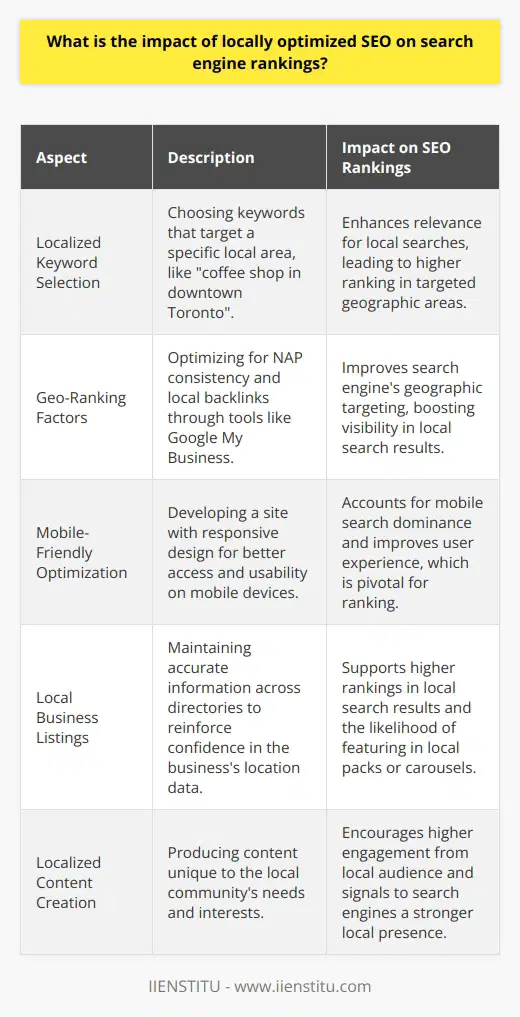
How can businesses effectively combine local signals and personalization in their SEO strategies?
Incorporating Local Signals
To effectively combine local signals in their SEO strategies, businesses must ensure that their online presence aligns with local search patterns. This involves optimizing their website and content with local keywords and key phrases that target the specific geographic area catered to by the organization. Additionally, businesses should create and maintain listings on local directories and review platforms, such as Google My Business, Yelp, and TripAdvisor. These listings provide search engines with accurate and consistent information about the company's location, contact information, and provided services.
Leveraging Personalization
Personalization is increasingly crucial for businesses aiming to improve their SEO performance. This can be achieved through the utilization of website cookies and visitor data to deliver personalized content and recommendations to users based on their individual preferences and browsing history. Furthermore, businesses can leverage social media platforms to provide tailored promotional content to their followers, based on their likes, sharing history, and location data. Moreover, employing email marketing campaigns that segment subscribers allows for targeted messaging that resonates with recipients, increasing the likelihood of engagement.
Combining Local Signals and Personalization
To achieve a harmonious balance between local signals and personalization, businesses need to focus on crafting relevant and personalized content that addresses the specific needs and wants of their local audience. This requires the development of localized landing pages, which cater to the unique demands of various regions, and the incorporation of personalized calls to action. Integrating these strategies not only ensures that businesses can effectively target local users but also enhances the overall user experience, which is a vital factor in SEO success.
Monitoring and Measuring Success
Continuous monitoring and assessing of the implemented strategies is essential for businesses to ensure the effectiveness of their SEO efforts. This includes utilizing analytics platforms, such as Google Analytics and SEMrush, to track key performance indicators, including website traffic, search engine rankings, and conversion rates. Regularly reviewing these metrics enables businesses to fine-tune their local signals and personalization efforts to achieve optimal results.
In conclusion, effectively combining local signals and personalization in SEO strategies requires businesses to optimize their online presence for local search patterns, personalize their marketing efforts based on audience preferences, and continuously monitor their performance. Embracing these techniques will result in improved search engine rankings, increased web traffic, and an enhanced digital experience for users, ultimately driving the overarching success of a business.
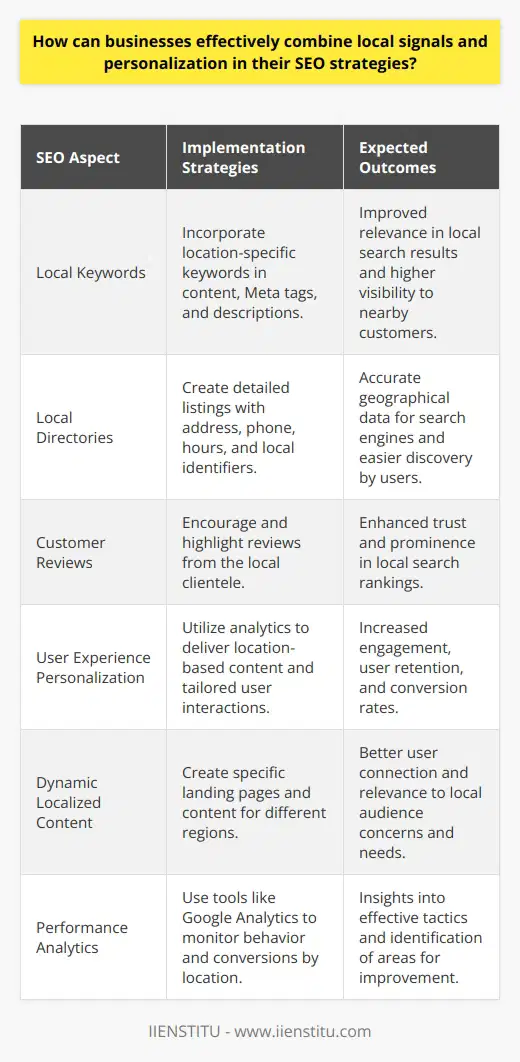
What role do local citations and reviews play in improving local SEO?
Citations and Reviews: Essentials for Local SEO
Significance of Local Citations
Local citations, which consist of mentioning the name, address, and phone number of a business on various online platforms, play a major role in local SEO. Accurate and consistent citations increase the credibility and visibility of businesses, helping search engines like Google recognize them as valid sources for local search results. This signals to search engines that a business is both legitimate and reputable.
Impact of Reviews on Rankings
Similarly, reviews contribute to the online reputation of a business, displaying customer satisfaction levels and shaping public perception. Studies have found a strong correlation between the number of reviews a business has and its search rankings, indicating that the quantity and quality of reviews can significantly influence local SEO. Positive reviews can raise a business's position in search engine results, driving more clicks and conversions, while negative reviews can harm rankings and deter potential customers.
Encouraging Customer Reviews
Businesses should develop strategies to encourage customers to leave reviews, such as implementing an easy-to-use review system and providing incentives in the form of discounts or rewards. These practices can boost a business's chances of obtaining positive reviews, which, in turn, will enhance their online presence and standing in local search results. Moreover, businesses should also actively respond to customer feedback, creating an ongoing dialogue with customers and offering a glimpse into their dedication to maintaining customer satisfaction.
Monitoring and Managing Citations
Effective management of local citations requires businesses to monitor, verify and update their listings across various online directories and platforms, ensuring information accuracy and consistency. This thorough management process also involves the elimination of duplicate listings, rectification of inaccuracies, and the addition of relevant information, such as opening hours or specific services. By closely managing their citations, businesses increase their chances of attaining higher local rankings and, ultimately, boost their online visibility.
Conclusion
As critical components of local SEO, both local citations and reviews hold the potential to significantly impact a business's online visibility and credibility. By diligently managing and monitoring these factors, businesses can improve their search rankings, thereby increasing their chances of attracting and retaining customers, as well as cementing a position of trust and authority in their respective industries.
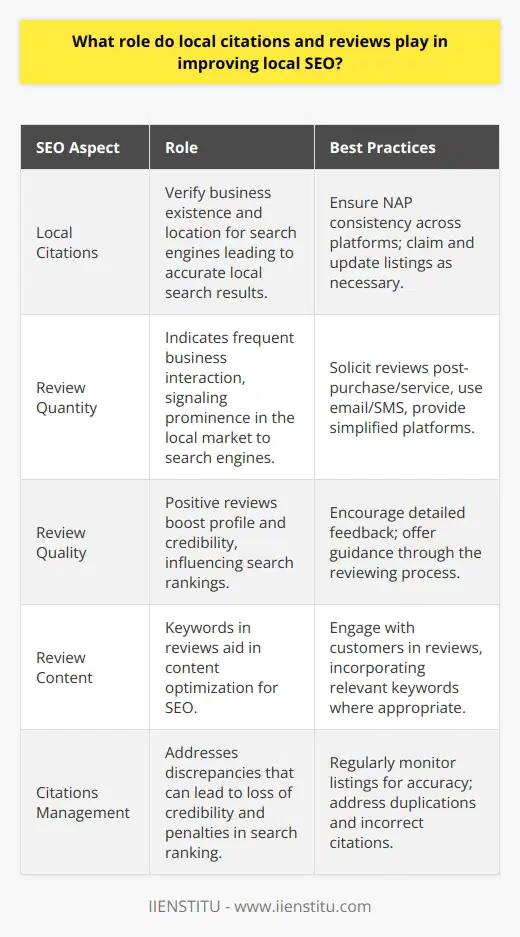
What is the difference between SEO and local SEO?
SEO Versus Local SEO
SEO (Search Engine Optimization) and local SEO are distinct concepts within digital marketing. SEO is all about maximizing a website's visibility in the global digital landscape. Techniques used in SEO increase a website's position in search engine results. This includes attributes such as site speed, mobile responsiveness, and quality content.
Local SEO: An Overview
Contrarily, local SEO aims to enhance visibility specifically within a particular geographic area. This is particularly valid for businesses with physical locations. Local SEO takes into account factors like name, address, and phone (NAP) consistency across online listings. It also emphasizes on local keywords, customer reviews, and the presence in local directories.
The Role of Keywords
Keywords play critical roles in both SEO and local SEO. In SEO, keywords are broad and global. Local SEO, however, is more particular. It uses keywords that are specific to the locality of the business. These could include the city, neighborhood, or street name.
The Importance of Reviews
Reviews have an integral part in local SEO. They play a less significant role in traditional SEO. Positive customer testimonials can increase credibility and rank in local search results. Hence, businesses aiming for local prominence should concentrate on collecting good reviews.
The Significance of Backlinks
In SEO, significant importance is placed on gaining backlinks from credible and relevant sources. In local SEO, while backlinks remain significant, the focus is on relevance to the local area. Links from locally influential sites have more weight.
In conclusion, while SEO and local SEO share a common objective - improving website visibility - their approaches are different. SEO is more global, focusing on the overall search ranking, while local SEO is area-specific and focuses on enhancing local online presence. Hence, businesses should strategically employ both according to their individual needs.
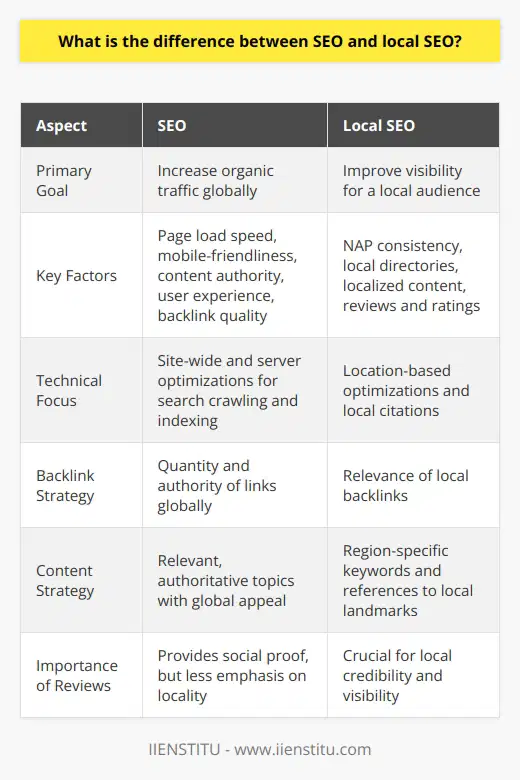
How does personalization impact SEO?
Impact of Personalization on SEO
Personalization significantly impacts Search Engine Optimization (SEO). The core purpose of SEO is to enhance user experience, and personalization enhances this. Ranking algorithms favor personalized content.
Personalized User Experience
When users find tailored content, they stay longer. They might even become loyal customers. This increase in 'dwell time' helps improve a webpage's SEO rank.
Customized Content
Search engines prioritize customized content. Personalization ensures relevancy, increasing the likelihood of higher click-through-rates. Moreover, personalized content enhances user engagement, which search engines consider when ranking.
Local SEO
Personalization is key for local SEO. Local data and location-based content serve to enhance personalization. Thus, boosting a webpage's visibility and ranking.
User Behavior
Search engines value websites that fulfill user intent. With personalized content, websites can better meet the demands and interests of users. This alignment with user intent enhances SEO.
In conclusion, personalization directly influences SEO. Whether it's enhancing user experience, promoting engagement, or aligning with local SEO techniques, personalization helps to improve a site's search engine rank. However, while personalization improves SEO, it must follow ethical guidelines for it to bring long-term results.
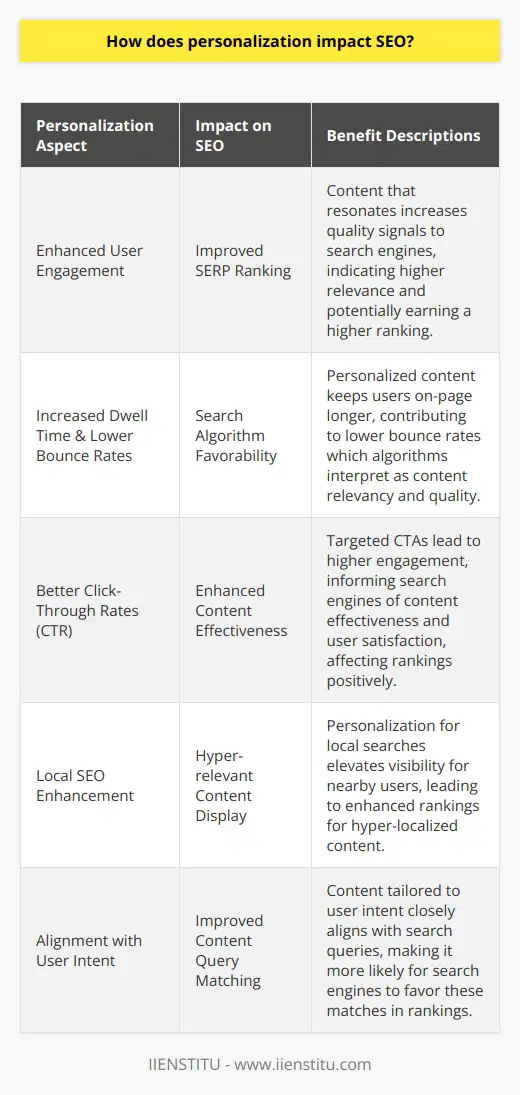
What are the best ways to locally optimize my site for local SEO?
Intensive Keyword Research
The best local SEO strategy begins with intensive keyword research. Use tools like Google Keyword Planner or Moz to find keywords specific to your location. These tools reveal the keywords people in your location frequently search. Integrate these keywords naturally into your website content.
Quality Content Creation
Then, focus on creating quality, localized content. Write blog posts or articles that appeal to your local community. Incorporate the localized keywords into these articles. Strive to make the content beneficial and engaging to the local audience. If possible, get local influencers or personalities associated with your brand.
Google My Business Listing
Also, don't forget to exploit Google My Business listings. Fill in all company details (name, address, phone number, operating hours, etc.) accurately. Incorporate keywords in the description. Request your happy customers to leave reviews there. Reviews not only make your business look reliable but also boost your local search rankings.
On-Page SEO Activities
Carry out on-page SEO activities. Make sure each page of your site has a meta title and description containing your localized keywords. Use these keywords in your content, URL, headers, etc. This sends strong signals to Google's crawlers about your website's relevancy to the local searchers.
Backlink Building
Build backlinks from local platforms. Contact the local bloggers, news portals, influencers, etc., for backlink opportunities. Backlinks from these geographical-specific sources will strengthen your site's local SEO.
User-Experience Optimization
Lastly, optimize your website experience. Ensure that your site loads fast, is mobile-friendly, and easy to navigate. A convenient user experience keeps your site visitors engaged, reducing the bounce rate, and signaling Google about the utility of your website to the local audience.
In conclusion, local SEO takes strategy and consistent effort. By following these steps, you can increase your website's visibility to your local audience.
![Engaging in local SEO involves a strategic approach that includes several key practices designed to increase your website's visibility among the local audience and improve your search engine ranking in location-specific queries. Taking proactive steps in each area can lead to significant benefits for your website's performance in local search results. Here's how to optimize your site effectively for local SEO:1. **Intensive Keyword Research:** Begin with comprehensive keyword research that targets your geographical area. Utilize tools like Google Keyword Planner to discover the terms and phrases local customers are using. For instance, instead of targeting generic terms, focus on keywords such as best coffee shop in [City Name] or affordable plumbers near [Neighborhood]. Incorporate these area-specific keywords tastefully across your site content, ensuring natural integration that appeals to users and search engines.2. **Quality Content Creation:** Create content that resonates with your local audience. Whether it's blog posts, infographics, or videos, make sure it addresses the interests and needs of your community. Regularly publishing useful content can establish your website as a resource hub for local residents, driving traffic and engagement. Cover local events, sponsorships, or issues to augment your relevance within the community.3. **Google My Business Listing:** A complete and optimized Google My Business (GMB) listing is a pivotal component of local SEO. Ensure every detail is accurate and update your profile with fresh content, such as posts, offers, and events. Encourage customers to review your business on GMB, as positive reviews can enhance your credibility and ranking in local search.4. **On-Page SEO Activities:** On-page SEO is crucial for local search optimization. Tailor your meta titles and descriptions with local keywords and ensure your NAP (Name, Address, Phone Number) is consistent across your site. Optimize headers, image alt-text, and content with location-specific keywords, enhancing local search relevancy.5. **Backlink Building:** Backlinks from reputable local sources can significantly bolster your local search rankings. Establish relationships with local media, organizations, and bloggers to earn backlinks that carry geographical weight. Participate in community events or initiate charity programs to get mentioned by local entities, garnering both backlinks and goodwill.6. **User-Experience Optimization:** A smooth, efficient user experience (UX) is instrumental for keeping visitors on-site. Prioritize mobile responsiveness given the prevalence of on-the-go searches. Additionally, ensure page load speeds are quick, navigation is intuitive, and content is accessible and digestible. A top-notch UX is a signal to search engines that your site is a quality destination for local searchers.By meticulously applying these practices, you can boost your local SEO efforts, making it easier for your target audience to find and engage with your business online. Remember that local SEO is an ongoing process, requiring regular updates and adjustments as your business and community evolve. With the right strategies in place, local SEO can become a powerful tool for connecting with your local market and driving business growth.](https://img.iienstitu.com/assets/blog/en/optimizing-seo-with-local-signals-personalization/faqs/9/images/22b83ba2ce4713131fece3a347e77d9dbe331920.jpeg?v=2025-11-13&width=3840&quality=60&format=webp)
How do I optimize my website for local SEO?
Local SEO Optimization Techniques
To optimize your website for local SEO, you need to implement a multi-pronged strategy centered on relevancy, proximity, and prominence.
Effective Keyword Usage
Begin by using locally-focused keywords within your site's meta title and description. These areas are crucial for search engine algorithms. Research for keywords that resonate with your local audience, and incorporate them tactfully.
Accurate NAP Information
Ensure your Name, Address, and Phone number (NAP) information is accurate and consistent across your site. Search engines use this data in their ranking algorithm. Consistent NAP information boosts your chances of higher ranking.
Google My Business Profile
Create a Google My Business (GMB) profile. This step is vital, as search engines often prioritize data from GMB listings. Ensure to include your business's name, contact information, operating hours, and high-quality photos.
Manage Online Reviews
Monitor and respond appropriately to online reviews. Positive reviews directly influence your website's local search ranking. Engage with users who leave feedback, as this can foster trust and impact your search engine ranking positively.
Effective Link Building
Consider locally-focused link building, as search engines view inbound links as signs of trust. Collaborate with local influencers or write guest posts for local blogs, thereby gaining high-quality backlinks.
Leverage Local Structured Data Markup
Use local structured data markup. This technique enhances your site's visibility to search engines by clarifying its contents. It can increase the chances of your website appearing in relevant local search results.
In conclusion, optimizing a website for local SEO requires strategic keyword usage, accurate NAP information, active GMB profiles, effective link-building, and leveraging local structured data markup. By following these steps, you are better poised to improve your website's local search engine ranking.
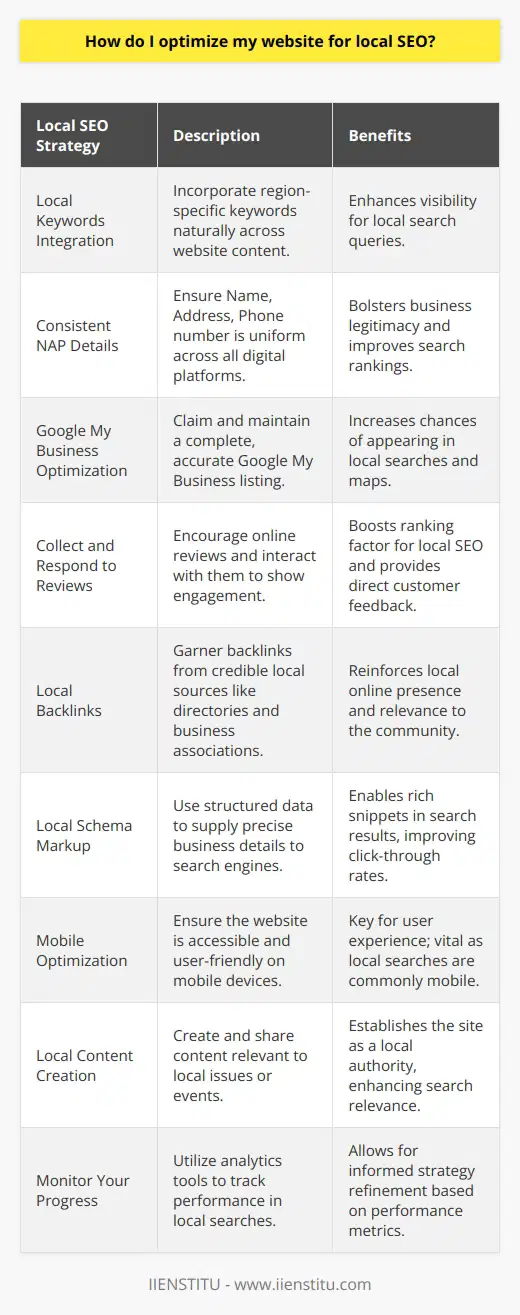
What is a local SEO strategy?
Local SEO Strategy Defined
A local SEO strategy is an approach to digital marketing with a specific focus. This focus targets a localized audience, aiming to increase the visibility of a brick-and-mortar business regionally.
Implementation of Local SEO Strategy
Implementing this strategy involves many techniques. Firstly, it includes optimizing a company's online presence on local search results. This usually involves Google My Business listings, where one lists their business to appear on local searches.
Role of Keywords in Local SEO
Another essential aspect involves keyword optimization. Here, one uses locally-focused keywords in their website’s meta tags, meta descriptions, content and even HTML tags.
Local Citations in SEO
Consider also local citations; these are online mentions of the business. They comprise the business name, location, and phone number, seen on directory listings, websites, or social platforms.
Significance of Reviews
Business reviews also play a critical role. Encouraging customers to review your business can greatly escalate its credibility.
Role of Social Media
Moreover, social media is a powerful tool. Regular interaction with the local audience through these platforms proves productive.
Value of Local SEO Strategy
A comprehensive local SEO strategy is invaluable in today's digital marketing context. It helps businesses appear prominently on local searches, attracting more foot traffic and improving sales.
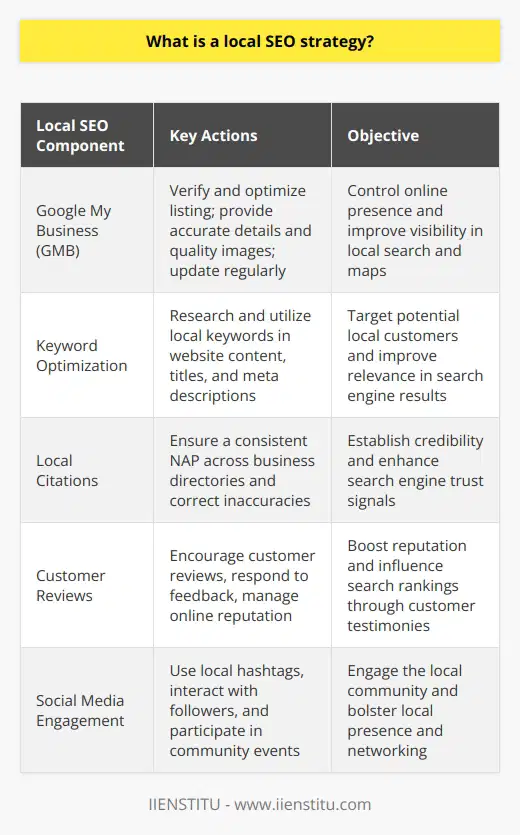
How does personalization impact SEO?
Impact of Personalization on SEO
Personalization directly influences Search Engine Optimization (SEO). As search engines strive to deliver the most relevant results to users, they consider personalized data.
User Engagement and Interaction
The relevance of content to user behavior significantly impacts SEO rankings. When users find personalized content appealing, they interact more with the webpage. Such interactions can increase dwell time and reduce bounce rates, which bolsters SEO rankings.
Data Localization Impact
Search engines can localize search results based on user location. Local personalization can benefit businesses targeting a specific geographical audience. High ranking in local search results improves visibility and organic traffic.
Search History and Intent
Search habits and history can personalize user experience. Search engines often consider historical data to predict user intent. Accurate prediction means delivering targeted content that captures users' interest. This can improve SEO by increasing page relevancy and user satisfaction.
Content Customization and User Experience
Customizing content to fit a user's preference can encourage repeat visits. Enhanced user experience leads to an increase in organic search traffic, boosting SEO rankings. Consequently, a seamless user experience supports better SEO outcomes.
In conclusion, personalization plays a significant role in SEO. By offering tailor-made content and predicting user intent, businesses can enhance user experience and engagement. As a result, they can achieve better SEO ranking, increased visibility, and heightened organic traffic. Thus, customization should be an integral part of any effective SEO strategy.



